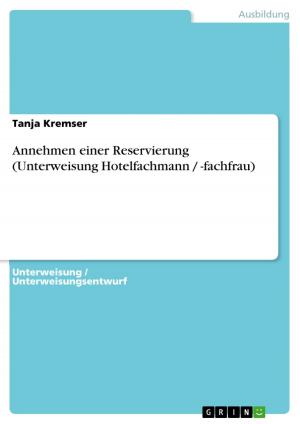| Author: | Janna Falkenstein | ISBN: | 9783638622851 |
| Publisher: | GRIN Verlag | Publication: | March 8, 2007 |
| Imprint: | GRIN Verlag | Language: | English |
| Author: | Janna Falkenstein |
| ISBN: | 9783638622851 |
| Publisher: | GRIN Verlag |
| Publication: | March 8, 2007 |
| Imprint: | GRIN Verlag |
| Language: | English |
Seminar paper from the year 2006 in the subject American Studies - Linguistics, grade: 1,3, Free University of Berlin (Englische Philologie), 23 entries in the bibliography, language: English, abstract: The subject of this paper is the variety African American Vernacular English (AAVE) formerly known as Black English Vernacular among linguists and often called Ebonics in the media. I will use the term AAVE throughout this paper. AAVE is a variant of English that shows some unique features no other variant of English shares. Aside there is a huge amount of commonalities between AAVE and Standard English (SE) and English vernaculars. Most of the commonalities AAVE shares with non-standard variants of the south of the United States. But even Caribbean languages resemble AAVE; a fact that has led to discussions about the origins of AAVE and its status. There are two theories in competition: the dialectal hypothesis and the Creole hypothesis. The discussion is not only linguistically interesting but also of political importance. This will be discussed in the first two chapters of this paper. It is very difficult to say how many people speak AAVE. There may be speakers who use AAVE pronunciation and vocabulary but none of the grammatical features. Others may use other distinctive aspects of the variant. Linguists generally use the term AAVE for those variants that show certain distinctive grammatical features like copula deletion, losing of third person singular -s or double negation. Since these grammatical features occur variably - that means in alternation with features of Standard English - it remains difficult to say how many people speak AAVE. This variability shows the complex social attitudes that surround AAVE. Among other things that is why it has attracted the attention of many sociolinguists and has been the main focus of several public discussions. Ten years ago a resolution passed by the Oakland School Board hit the headlines. In comparison to their white contemporaries black children come off badly in school. As a result the members of the School Board claimed that AAVE should be officially recognized 'as the predominantly primary language of African-American students'. [...]
Seminar paper from the year 2006 in the subject American Studies - Linguistics, grade: 1,3, Free University of Berlin (Englische Philologie), 23 entries in the bibliography, language: English, abstract: The subject of this paper is the variety African American Vernacular English (AAVE) formerly known as Black English Vernacular among linguists and often called Ebonics in the media. I will use the term AAVE throughout this paper. AAVE is a variant of English that shows some unique features no other variant of English shares. Aside there is a huge amount of commonalities between AAVE and Standard English (SE) and English vernaculars. Most of the commonalities AAVE shares with non-standard variants of the south of the United States. But even Caribbean languages resemble AAVE; a fact that has led to discussions about the origins of AAVE and its status. There are two theories in competition: the dialectal hypothesis and the Creole hypothesis. The discussion is not only linguistically interesting but also of political importance. This will be discussed in the first two chapters of this paper. It is very difficult to say how many people speak AAVE. There may be speakers who use AAVE pronunciation and vocabulary but none of the grammatical features. Others may use other distinctive aspects of the variant. Linguists generally use the term AAVE for those variants that show certain distinctive grammatical features like copula deletion, losing of third person singular -s or double negation. Since these grammatical features occur variably - that means in alternation with features of Standard English - it remains difficult to say how many people speak AAVE. This variability shows the complex social attitudes that surround AAVE. Among other things that is why it has attracted the attention of many sociolinguists and has been the main focus of several public discussions. Ten years ago a resolution passed by the Oakland School Board hit the headlines. In comparison to their white contemporaries black children come off badly in school. As a result the members of the School Board claimed that AAVE should be officially recognized 'as the predominantly primary language of African-American students'. [...]















